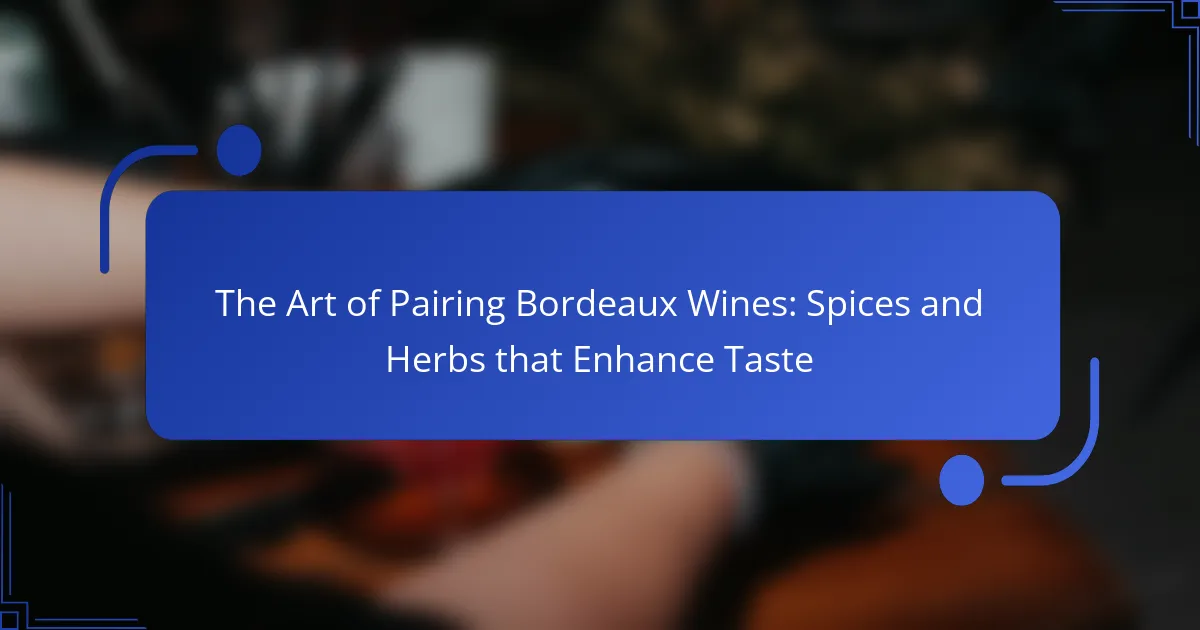
What is the Art of Pairing Bordeaux Wines with Spices and Herbs?
The art of pairing Bordeaux wines with spices and herbs involves understanding flavor profiles. Bordeaux wines typically feature rich, fruity, and tannic characteristics. Spices and herbs can enhance these flavors when matched appropriately. For example, thyme complements the herbal notes in Bordeaux. Rosemary can enhance the wine’s structure and complexity. Additionally, black pepper can accentuate the wine’s fruitiness. Each pairing should consider the wine’s body and acidity. Successful pairings create a balanced and harmonious dining experience. This approach is rooted in culinary traditions that emphasize flavor synergy.
How does the pairing process enhance the overall wine experience?
The pairing process enhances the overall wine experience by creating harmonious flavor combinations. When wine is paired with food, it can elevate both the wine and the dish. This synergy often results in a more enjoyable tasting experience. Specific pairings can highlight the wine’s unique attributes. For instance, a Bordeaux wine’s tannins may soften when paired with rich meats. Additionally, certain spices can complement the wine’s acidity. Research shows that pairing enhances perception of flavors, making each sip more memorable. The right pairing can transform a simple meal into a culinary event.
What role do spices and herbs play in complementing Bordeaux wines?
Spices and herbs enhance the flavor profile of Bordeaux wines. They create harmony between the wine’s characteristics and food. For instance, rosemary and thyme complement the tannins in Bordeaux reds. Spices like black pepper add complexity to the wine’s fruitiness. Herbs also elevate the wine’s aromatic qualities. This pairing tradition dates back centuries in French cuisine. Studies show that specific herbs can enhance the perception of wine’s body and finish. Overall, spices and herbs play a crucial role in elevating the dining experience with Bordeaux wines.
How do different Bordeaux wine varieties influence pairing choices?
Different Bordeaux wine varieties significantly influence pairing choices due to their unique flavor profiles. For example, Cabernet Sauvignon is known for its bold tannins and dark fruit flavors. This wine pairs well with rich meats like steak and lamb. Merlot, with its softer tannins and fruity notes, complements dishes like roasted chicken and pasta with tomato sauce.
Furthermore, Bordeaux Blanc varieties, such as Sauvignon Blanc, offer crisp acidity and citrus notes. These characteristics make them suitable for pairing with seafood and light salads.
In contrast, dessert wines like Sauternes have a rich sweetness that pairs well with foie gras and blue cheese. Each Bordeaux variety’s distinct attributes guide the selection of complementary flavors in food pairings, enhancing the overall dining experience.
Why is understanding flavor profiles important in wine pairing?
Understanding flavor profiles is crucial in wine pairing because it ensures complementary tastes. Flavor profiles encompass the aromas and tastes of both the wine and the food. Matching these profiles enhances the overall dining experience. For example, a full-bodied red wine pairs well with rich meats. This combination balances flavors and prevents one from overpowering the other. Studies show that harmonious pairings can elevate the perception of both food and wine. Therefore, knowledge of flavor profiles leads to more satisfying and enjoyable meals.
What are the key flavor profiles of Bordeaux wines?
Bordeaux wines typically exhibit key flavor profiles of dark fruits, earthy notes, and oak. Common dark fruit flavors include blackcurrant, plum, and cherry. These fruits are often complemented by earthy undertones such as leather, tobacco, and forest floor. Additionally, Bordeaux wines frequently showcase oak-derived flavors like vanilla, spice, and toast. The blend of these elements creates a complex and rich tasting experience. Bordeaux wines are primarily made from grape varieties like Cabernet Sauvignon, Merlot, and Cabernet Franc, which contribute to these flavors. The region’s terroir and winemaking techniques further enhance these profiles, making Bordeaux wines distinctive.
How can spices and herbs alter the perception of these flavors?
Spices and herbs can significantly alter the perception of flavors in Bordeaux wines. They enhance or complement the wine’s inherent characteristics. For example, herbs like rosemary can add aromatic complexity. Spices such as black pepper can introduce a subtle heat that contrasts with the wine’s sweetness. This interaction can also modify the wine’s acidity perception. The combination of spices and herbs can create a more balanced taste experience. Studies show that aromatic compounds in herbs can interact with wine molecules. This interaction can lead to a heightened sensory experience. Therefore, the right pairing can elevate the overall enjoyment of Bordeaux wines.

What spices are best suited for pairing with Bordeaux wines?
Black pepper, cloves, and rosemary are best suited for pairing with Bordeaux wines. Black pepper enhances the wine’s fruitiness. Cloves add a warm spice note that complements the wine’s complexity. Rosemary contributes an aromatic quality that balances the wine’s tannins. These spices are often used in dishes that pair well with Bordeaux. For instance, roasted meats seasoned with these spices can elevate the wine experience. The synergy between the spices and Bordeaux wines creates a harmonious flavor profile.
Which spices enhance the characteristics of red Bordeaux wines?
Black pepper, cloves, and cinnamon enhance the characteristics of red Bordeaux wines. Black pepper adds a spicy kick that complements the wine’s tannins. Cloves provide a warm, aromatic quality that pairs well with the wine’s fruitiness. Cinnamon introduces a sweet, warming spice that enhances the overall complexity. These spices interact with the wine’s rich flavors, creating a balanced tasting experience. Studies show that spices can elevate the sensory profile of wines, making them more enjoyable.
How do spices like black pepper and cinnamon affect the tasting experience?
Spices like black pepper and cinnamon significantly enhance the tasting experience. Black pepper adds a sharp, pungent heat that can elevate the overall flavor profile of a dish. It stimulates the palate and enhances the perception of other flavors. Cinnamon contributes warmth and sweetness, providing a contrasting balance to savory elements. It also adds complexity and depth to the tasting experience. Studies show that spices can activate taste receptors, leading to heightened flavor sensations. The combination of these spices can create a more dynamic and enjoyable tasting experience, especially when paired with Bordeaux wines.
What unique attributes do these spices bring to the pairing?
Unique spices in wine pairing bring distinct flavor profiles and aromatic qualities. For instance, black pepper enhances the wine’s complexity with its sharpness. Cinnamon adds warmth and sweetness, balancing the tannins in Bordeaux wines. Cloves introduce a rich, aromatic depth that complements fruity notes. Rosemary contributes a pine-like freshness, enhancing herbal nuances in the wine. Each spice uniquely interacts with the wine’s characteristics, enhancing the overall tasting experience. These attributes create a multi-layered flavor profile, making the pairing more enjoyable.
Which spices work well with white Bordeaux wines?
White Bordeaux wines pair well with spices such as coriander, dill, and white pepper. Coriander complements the citrus notes in these wines. Dill enhances the herbal qualities and works well with seafood dishes often paired with white Bordeaux. White pepper adds a subtle heat that balances the wine’s acidity. These spices enhance the overall tasting experience. Studies show that these combinations can elevate both the wine and the dish.
What are the effects of herbs like dill or basil on white Bordeaux flavors?
Herbs like dill and basil can enhance the flavors of white Bordeaux wines. Dill adds a fresh, slightly tangy note that complements the wine’s acidity. Basil introduces a sweet, aromatic quality that can elevate the wine’s fruitiness. These herbs interact with the wine’s natural citrus and floral notes, creating a more complex tasting experience. The combination of these herbs can also emphasize the herbal undertones present in many white Bordeaux varieties. This enhances the overall flavor profile, making the wine more enjoyable.
How does the acidity of white Bordeaux wines interact with these spices?
The acidity of white Bordeaux wines enhances the flavors of various spices. This interaction creates a balance that elevates the overall tasting experience. High acidity in these wines can complement spices like coriander and ginger. It cuts through the richness of dishes, making them feel lighter. The crispness of the wine can also soften the heat of spicy ingredients. This dynamic can enhance the perception of freshness in the dish. Studies show that acidity in wine can amplify the aromatic qualities of spices. This results in a more harmonious pairing overall.

What herbs can elevate the taste of Bordeaux wines?
Thyme, rosemary, and basil can elevate the taste of Bordeaux wines. Thyme adds earthy notes that complement the wine’s tannins. Rosemary offers a robust flavor that enhances the wine’s complexity. Basil introduces a fresh, aromatic quality that balances the wine’s richness. These herbs can be used in marinades, sauces, or as garnishes. Their aromatic profiles interact well with the fruity and spicy notes found in Bordeaux wines. Studies show that the right herbs can enhance the overall tasting experience.
How do fresh herbs enhance the flavors of Bordeaux wines?
Fresh herbs enhance the flavors of Bordeaux wines by adding aromatic complexity and balancing the wine’s tannins. Herbs like thyme, rosemary, and basil contribute herbal notes that complement the wine’s fruit and oak characteristics. The aromatic compounds in fresh herbs interact with the wine’s flavor profile, creating a harmonious experience. For example, thyme’s earthy notes can highlight Bordeaux’s dark fruit flavors. Additionally, the freshness of herbs can elevate the wine’s acidity, making it more vibrant. Studies have shown that pairing herbs with wine can enhance sensory perception, leading to a more enjoyable tasting experience.
What specific herbs pair well with various Bordeaux wine styles?
Thyme, rosemary, and basil pair well with various Bordeaux wine styles. Thyme complements red Bordeaux, enhancing its earthy notes. Rosemary works well with rich, full-bodied Bordeaux, accentuating its complexity. Basil pairs nicely with lighter Bordeaux styles, bringing freshness to the palate. These herbs enhance the wine’s flavor profile, creating a harmonious tasting experience.
How does the freshness of herbs impact the overall pairing experience?
Freshness of herbs significantly enhances the overall pairing experience. Fresh herbs provide vibrant flavors and aromas that elevate the taste of dishes. The essential oils in fresh herbs are more potent than those in dried herbs. This potency can complement the complex notes found in Bordeaux wines. For example, fresh basil can add a peppery note that pairs well with certain red Bordeaux. Additionally, fresh herbs can contribute to a more balanced flavor profile in a dish. This balance can enhance the wine’s characteristics, making the pairing more enjoyable. Studies show that fresh herbs can improve sensory perception in food and wine pairings.
What are some common mistakes to avoid when pairing spices and herbs with Bordeaux wines?
Common mistakes to avoid when pairing spices and herbs with Bordeaux wines include overwhelming the wine’s flavor profile. Using strong spices like cumin or curry can mask the wine’s subtle notes. Additionally, pairing herbs that clash with the wine’s tannins can result in an unbalanced taste. For example, pairing Bordeaux with overly bitter herbs like arugula can create a discordant experience. Another mistake is ignoring the wine’s body; lighter wines should be paired with milder herbs. Conversely, robust Bordeaux wines can handle bolder spices. Lastly, not considering the wine’s acidity can lead to poor pairings; acidic wines often complement herbs like basil or cilantro.
How can over-seasoning affect the balance of flavors?
Over-seasoning disrupts the balance of flavors in a dish. It can overpower the natural taste of ingredients. Excessive salt or spices masks subtle flavors. This can lead to an unpalatable dish that lacks complexity. The ideal seasoning enhances, rather than dominates, the overall profile. Research shows that balanced seasoning improves taste perception. For example, a study by the University of California found that proper seasoning can enhance flavor intensity by up to 30%.
What tips can help ensure successful pairings?
Successful pairings of Bordeaux wines with spices and herbs require careful consideration of flavor profiles. First, match the wine’s body with the intensity of spices. For example, full-bodied Bordeaux pairs well with robust spices like black pepper. Second, consider the wine’s acidity; it complements herbs like basil and cilantro that add freshness. Third, balance sweetness in wines with spicy dishes; for instance, a sweet Bordeaux can offset heat in spicy cuisine. Fourth, avoid overpowering flavors; subtle herbs enhance rather than overwhelm the wine’s characteristics. Finally, experiment with regional pairings; local herbs and spices often complement Bordeaux effectively. These strategies enhance the overall tasting experience and elevate the wine’s qualities.
What practical tips can enhance your Bordeaux wine pairing experience?
Choose complementary flavors to enhance Bordeaux wine. Rich reds pair well with hearty dishes. For example, Cabernet Sauvignon complements grilled meats. Merlot pairs nicely with roasted vegetables. Consider the wine’s tannins when selecting food. High tannin wines match with fatty dishes. Use herbs like rosemary and thyme for added depth. These herbs enhance the wine’s fruitiness. Experiment with spices like black pepper for a bold kick. Pairing enhances both food and wine enjoyment.
How should you approach experimenting with different spices and herbs?
To approach experimenting with different spices and herbs, start by selecting a base ingredient. This can be a protein, vegetable, or grain. Next, choose one or two spices or herbs to pair with the base. This method allows you to observe flavor interactions without overwhelming the dish. Gradually increase the complexity by adding more spices or herbs as you become comfortable.
Use fresh ingredients when possible, as they often have a more potent flavor. Consider the cooking method, as some spices release flavors differently when heated. For example, toasting spices can enhance their aroma and taste. Document your combinations and results to refine your approach over time.
Research indicates that certain spices can enhance the flavor of wines, providing a more enjoyable tasting experience. For instance, herbs like rosemary and thyme complement Bordeaux wines well. This insight can guide your experimentation with herbs and spices in pairing them with wines.
What are the best practices for serving Bordeaux wines with spices and herbs?
Serve Bordeaux wines at the appropriate temperature to enhance their flavors. Red Bordeaux is best served between 60°F and 65°F. White Bordeaux should be chilled to around 50°F to 55°F. Pair Bordeaux wines with herbs like rosemary and thyme, which complement their earthy notes. Use spices such as black pepper and cloves to enhance the wine’s complexity. Avoid overwhelming the wine with strong spices like chili or curry. Consider the wine’s body; full-bodied reds pair well with richer dishes. Light-bodied whites match better with lighter fare. Finally, serve Bordeaux wines in appropriate glassware to maximize aroma and flavor.
The main entity of the article is Bordeaux wines, specifically focusing on the art of pairing them with spices and herbs to enhance their taste. The article explores how different flavor profiles of Bordeaux wines interact with various spices and herbs, creating harmonious dining experiences. It discusses the influence of wine varieties on pairing choices, the importance of understanding flavor profiles, and the specific spices and herbs that complement both red and white Bordeaux wines. Additionally, the article provides practical tips for successful pairings and common mistakes to avoid, ensuring readers can elevate their wine tasting experiences.
